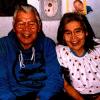|
Lindberg and Lydia Bergman, Part 1 |
I interviewed Lindberg and Lydia Bergman in their home in Allakaket, Alaska during the afternoon of November 23, l992. We sat around the living room area to make the tape. Since this was the first time Lindberg had ever been interviewed on tape, he was a little worried at first but soon became comfortable with the process. Lydia had a cold and a bad cough, but we still managed to make an excellent recording.
Lydia began by talking about her parents, some of her experiences growing up, and her brothers and sisters and other close family members. In this section of the tape, Lydia talks about the seasonal round and a variety of subsistence activities including various trapping and snaring techniques. In talking about close family members, she remembers her grandfather, South Fork Henry, and how he would babysit in camp and tell some of the many stories he knew. Some of these stories taught people how to behave with respect toward such powerful entities as bears and thunder. Others who are still important to her today are her Aunt Elizabeth Bergman, her Uncle Edward Bergman, her grandparents, Old Linus and Kathleen Linus, and her Uncle Joe Williams with whom she was quite close. She recalled how Uncle Joe, who was a good singer and speechmaker, worked hard to teach younger people how to live properly. She also remembers her best buddy from younger days, Jeanie Stevens, and another good friend Kitty David. She remembers, too, that in l945 her mother was not well so she stayed in town and went to school part of the time. She also played all sorts of ball games--softball, volleyball, football--and loved it, but when she got married, she had to stop playing games and be a like a grown up woman.
Lydia spent some time talking about how she first began to work for wages in l971 when she started babysitting for one of the school teachers. The next year she became an assistant cook at the school, and since l979 she has been the janitor for the Clinic and the City Hall. She also sews and sells the items she makes for income. I also asked Lydia about her interest in dog mushing. In l969 Lindberg bought a snowgo, and Lydia took over the dog team, feeding and running them. She started racing about 16 years ago and her living room attests to the trophies she has won. She is most proud of the trophy she won for winning the Allakaket Carnival race for three years.
Toward the end of the tape, we talked about Lydia's involvement with the Episcopal Church. Lydia recalls that she wanted to be a preacher since way back; now teaching her grandkids about the Lord is very important to her. A major aspect of her church activity is her opposition to drinking. Lydia recognizes that she herself is not perfect. She, too, drank, sometimes quite heavily, between l964 and l975. But she quit, and she sees how much quitting has changed her life. She sees, too, how much drinking hurts the community, and she wants to help others. In l99l, Allakaket built a new church building. This is at least the third log church building on or near the same site since Hudson Stuck had the original church built for St. John's-in-the-Wilderness Mission in l907-08. She describes how the community raised funds through a raffle and other fund-raising efforts, and volunteers from the community cut the logs and built the building.
|
93-15-03 |
Gates of the Arctic National Park |
Nov 23, 1992 |

